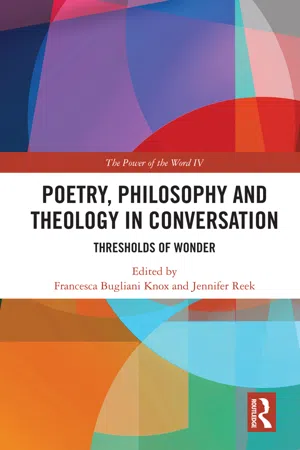
Poetry, Philosophy and Theology in Conversation
Thresholds of Wonder: The Power of the Word IV
- 248 pages
- English
- ePUB (mobile friendly)
- Available on iOS & Android
Poetry, Philosophy and Theology in Conversation
Thresholds of Wonder: The Power of the Word IV
About This Book
This volume is a collection of essays that explains how literature, philosophy and theology have explored the role of wonder in our lives, particularly through poetry. Wonder has been an object of fascination for these disciplines from the Greek antiquity onwards, yet the connections between their views on the subject are often ignored in subject specific studies.
The book is divided into three parts: Part I opens the conversation on wonder in philosophy, Part II is given to theology and Part III to literary perspectives. An international set of contributors, including poets as well as scholars, have produced a study that looks beyond traditional chronological, geographical and disciplinary boundaries, both within the individual essays themselves and in respect to one another. The volume's wide historical framework is punctuated by four poems by contemporary poets on the theme of wonder.
An unconventional foray into one of the best-known themes of the European tradition, this book will be of great interest to scholars of literature, theology and philosophy.
Frequently asked questions
Information
Part I
Philosophical perspectives
1 The wonder of not wondering
From Plato to Lucretius
Aristotle
Lucretius
Horace, Seneca, Panaetius, Posidonius
Table of contents
- Cover
- Half Title
- Title
- Copyright
- Dedication
- Contents
- List of figures
- Notes on contributors
- Preface and acknowledgements
- Introduction: why wonder?
- Part I Philosophical perspectives
- Part II Theological perspectives
- Part III Literary perspectives
- Part IV Afterword
- Index